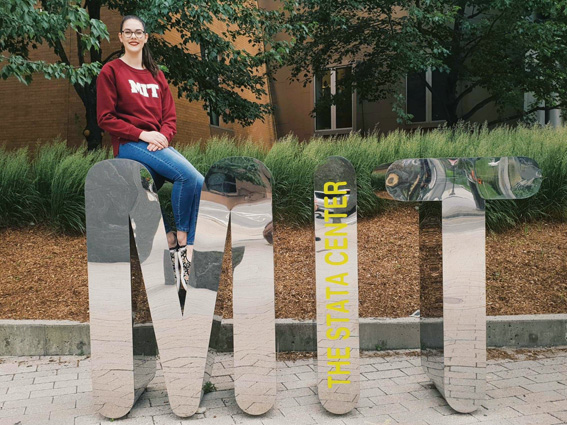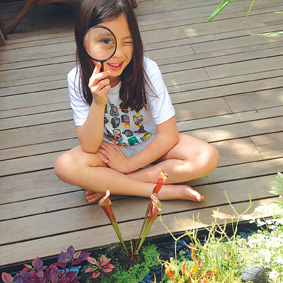
Smart cookie
MACINLEY BUTSON has come up with a new invention every year since she was seven years old. Charlotte spoke with this busy uni student about winning awards, failing exams, solving Rubik’s cubes and lots more.
+ + +
How did you feel winning first place at the International Science and Engineering Fair for your SMART Armour?
It was a little while ago now. I was in year 11 – no I wasn’t. I was in year 10, sorry. Hang on, what year is it now? I can’t keep track! It’s been a wild few years … But honestly, it was incredible. I never expected to win, so when they called out my name I let out a gasp and all my friends stood up and started cheering. My really close friend physically pushed me out of the chair, because I was sitting there in complete shock. It was only when I was walking to the stage that it dawned on me what had happened. I started crying – happy tears of course.
Do you feel scared or nervous when you enter competitions?
I don’t think I would say scared, but I always feel nervous. I used to get really, really, really nervous, then I started thinking about it more, and being nervous actually prepares you – it gets the adrenaline going. When I get nervous, it means I know that I care and want to put in my best effort. I just have to make sure I don’t let those nerves make me scared, because that’s when it isn’t healthy.
What is it that you like so much about inventing?
I’ve been inventing and I suppose experimenting for as long as I can remember. Even as a toddler and in primary school, I remember being really curious. I’d always be exploring or asking questions, and then I liked to try and come up with solutions to those problems. That’s where my passion for inventing, science and STEM comes from.
Inventing is also my way of helping people. We all have different skills, we all have different hobbies and we all have different interests. If we can use those in some way to help others, I think that’s awesome.
What invention are you most proud of?
That’s a tough one, it’s like asking me to choose a favourite child. I’d probably say the SMART Armour [SMART stands for Scale Maille Armour for Radiation Therapy] . Out of all my projects, it has won the most awards, but that’s not why I’m proud. It was a difficult project and took a lot of perseverance, and it’s the one I see has the most potential to help people. Someone close to me passed away from cancer last year, so it’s something which has become even more close to my heart.
You invented some sunglasses that you could change the tint. How do they work?
Those sunglasses were my first invention. I made them when I was seven years old. They work through something called polarisers: kind of like sheets of plastic that are grey, and if you put one in front of the other and start to rotate them, none of the light can get through when they’re 90 degrees to each other. I had magnets attached so you could twist them. They weren’t very attractive, but they worked!
I had this obsession with sunglasses. When I was seven, I had 15 pairs or more. My mum said no, we’re not buying any more sunglasses. I said, fine then, I’ll make another pair! Polarisers are already in a lot of sunglasses (they help to stop glare), so it was simple to add another layer.
Was your mum surprised?
She was probably surprised that I went ahead and actually did it, but I don’t think she would have been surprised that I wanted to do it. I was a very curious kid. I would always ask her questions, and we would do experiments – like the baking-soda-and-vinegar volcano that erupts. I think that was just the first time I actually went ahead and made something.
Are you working on a new invention now?
I’m focusing on the SMART Armour and SODIS Sticker [SODIS is short for ‘solar disinfection’], and trying to get them used – turning them from inventions into products.
But I do have another thing that I started in year 12 and I’m still slowly working on. It’s also used in radiation therapy. If I could try to explain: cancer isn’t usually found at skin level – it’s inside the body – but doctors have to treat the whole area. The healthy skin gets a radiation dose as well and that can cause painful burns. I’ve been looking at how we can reduce the skin dose, without changing the dose that the cancer gets. There’s still a lot of research to do.
Who are your role models? What did they teach you?
One person I really look up to is Elizabeth Blackburn. She’s the only Australian woman who has ever won a Nobel Prize. When I found that out, I was quite surprised. She’s paving the way for other girls and showing, especially in science, that you don’t have to be male, you don’t have to fit the stereotype of a typical scientist.
Other people a bit closer to home would be my teachers. They taught me a lot about myself, and a lot about kindness and giving back to others. They weren’t necessarily big people in spotlights giving inspirational quotes, but what they gave me, I want to be able to emulate and give to other people.
Did you like school?
I did, but I wasn’t very good at school. In year 11, I actually failed half my subjects at the same time as I received some awards. I always found it funny that outside school people would call me a scientist, and then at school I wasn’t doing well at science. I have ADHD, and the whole concentrating-and-sitting-down thing is really difficult. It was something I found out during year 11, when my marks crashed and people started noticing and thinking about my behaviour.
People call it a disorder or a disability, but for me it’s more a different style of thinking, and obviously it has its positives and it has its negatives. Things like thinking outside the box and coming up with these inventions come quite naturally to me, because that’s how my mind and my thinking works.
What was your most embarrassing moment at school?
I’m an incredibly clumsy person. I tripped over on the stairs going up to receive an award at assembly – that was awful. I tripped down the stairs and scraped both knees. That was embarrassing. I do a lot of tripping! It’s not one specific moment, it’s more – I was ‘that’ person.
How many fails have you had testing your inventions?
All the time! I used to get really upset when I thought I’d failed, but honestly failure has turned into a good thing. Sometimes it doesn’t feel good, but often when you fail, or when something doesn’t work, that’s when you learn more. Whether you’re doing science or art or music, there are going to be times when things don’t work. But those are the moments when, if you just keep going, the end is going to be better.
How do you deal with stress?
This has required a lot of growth and a lot of learning, and honestly I could probably still deal with stress better – but now, rather than focusing on the reason I’m stressed, I try to look at the big picture. If you’re not going to think about it in 10 years time, you shouldn’t think about it for more than 10 seconds now. I also try to think about some of the alternatives. For example, I was starting to get stressed about exams for university, but I reminded myself that one exam is not going to have a massive impact on the future – if I do fail that exam or I don’t do very well, I can just retake the subject.
Obviously with stress we always have to be careful that it’s not affecting our mental health or, if it is, to find help – which I have done, and I don’t think there’s any shame in that. And of course we all have good days and bad days.
Do you have any hidden talents?
Yes and no. I don’t know if they’re hidden talents, but they’re kind of interesting things. One is called poi dancing, and it’s something that came from New Zealand. A lot of people do it with fire twirling. A poi is kind of like a juggling ball attached to a string with fabric coming off the end, and you spin them. I can do that and it’s really fun.
I also solve Rubik’s cubes. I can do them on average in under two minutes, and I’m slowly trying to get faster and faster. There’s a process – for me it’s half intuition and half learning the patterns. My goal was to just do it once, and then I found that I actually really enjoy it.
Any hobbies (other than inventing)?
I have two main hobbies. I play the drums, and I love doing that! The other is dancing. I had to stop because I was too busy, but I danced for 15 years and it’s something I want to get back into – mainly ballet.
What makes you happy?
Obviously inventing. And helping others, of course, always. I love spending time with my friends, and I love seeing other people happy. With your friends you can relax and be who you are, and just have fun and laugh and make memories that are really special.
Does your name have a story behind it?
Definitely. I was going to be called Amelia, but the day before I was born, Mum and Dad were in hospital waiting for Mum to go into labour, watching a movie. At the end, when the credits started rolling, Mum saw ‘Macinley’ and thought it was really pretty. It was a last name, and Mum gave it to me as a first name the day after. So it comes from the credits of Toy Story!
Could you tell us a joke?
Two snare drums and a crash fall down the stairs. Badum-tish!
Oh, I get that! Hehehe … Last question. What advice do you have for girls who want to become inventors?
Don’t let anyone tell you that you can’t do something because of who you are. Whether that’s because you’re a girl and not a boy, or because you’re too young – or honestly, anything. Prove them wrong.
My other piece of advice is a quote: ‘If not us, then who? If not now, then when?’ [John Lewis]. Whenever things are getting difficult or not going the way I thought they might, I remind myself of this. Can I finish by asking you a question, Charlotte? If you could solve one problem in the whole world, what would it be?
I think I’d like to try solving how to make it rain.
That’s how my journey started: asking myself what questions I wanted to solve. When I started my inventions or started my projects, they seemed like impossible problems to solve, but there’s another saying: ‘It always seems impossible until it’s done’ [Nelson Mandela]. All my inventions have been very different, and that’s just because I like asking questions and trying to solve problems.
Thanks Macinley!
+ + +
INSIDE ISSUE 10, PUBLISHED MARCH 2020
An edited version of this interview appears in Kookie, along with extra information about Macinley Butson’s inventions and achievements. Thanks to Macinley for use of images.
+ + +

+ + +